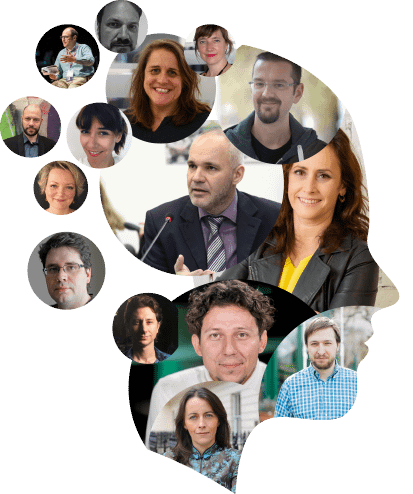I launched Bellingcat wanting to give people a place to publish articles about what they were doing using open source, and also to create resources for people to learn how to do it themselves.” Today, Bellingcat is a fully fledged organisation with 18 core staff across research, business and administration, a management team, a supervisory board, and “with proper policies” to quote Eliot. It has recently been registered in the Netherlands as a Public Benefit Corporation. Though it is no longer a volunteer dominated organisation, Bellingcat has retained the volunteer community as a key element: a network of open source investigators spread the use of open source methods while further developing tools and methodologies, maintaining a focus on justice and accountability.
Identify, verify, amplify
Bellingcat is not in the business of fact checking so much as “fact finding”. Still, disinformation is inherent to their activities, in that online open source investigation has a strong verification component. “You’re often dealing with debunking one side through open sources,” says Eliot. Their work revolves around three steps. First, they identify information online related to a topic of interest or importance (subjects include corruption, corporate misconduct, racial equality, far right movements, etc., but it is important that interests be led by the team). Next they verify that information using open source techniques, drawing strategically on volunteers and on an engaged social media community who can help with precise aspects like geolocation and identification. Finally they amplify that story, through a report, video, or podcast, or even as courtroom evidence. Bellingcat is increasingly exploring the role of open source evidence in legal processes; they have worked already with the ICC and the United Nations.
Much of what Bellingcat does could be considered capacity building. They offer training to journalists and fact checkers as well as to activists, NGOs and lawyers. These trainings also provide a source of revenue (currently 30 percent of their funding). Eliot sees Bellingcat as “a central node in the network that makes up the online open source investigation community”, a universe which spans human rights organisations, major media outlets, and individual Twitter users. Collaboration is key. “Often when we come across a project or something to investigate, and if it goes beyond the scope of what Bellingcat does or if it is something that can benefit from a collaboration, we’ll build coalitions of groups to work on topics.” They recognize this can be strange for media organisations who are accustomed to scoops and exclusives, so they’re strategic in bringing together non-competitive media and in building trust.
Though many organisations look to Bellingcat as an example, Eliot readily admits that “we’re figuring this stuff out as we go”. Beyond OSINT, the team is focused on the editorial and production side; Bellingcat is training their researchers in journalistic writing and building up a production company (which would be another source of income). They’re also leaning into their volunteer community (through a volunteer app and a Patreon), and trying to increase their impact with international governance stakeholders, for instance through developing standards for open source evidence in the area of justice and accountability.






